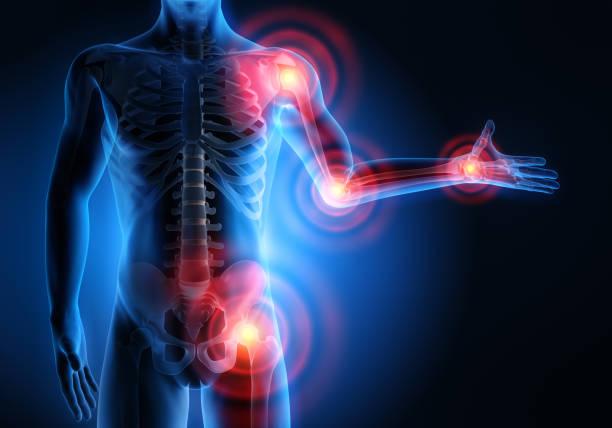Inflammation: What it is and how it affects your health

The word “inflammation” may induce thoughts of swollen joints or muscles, especially after injury – but, there is so much more to it than the general public is aware. Here, at Wicked Good, our goal is to help our clients better overall health and one of the best ways to do that is by reducing inflammation.
In this article, we will address what inflammation is, how it affects the body, possible negative effects of long-term inflammation and different ways to treat it.
To begin, let’s review what inflammation is, with a basic description: “Inflammation is part of the process by which the immune system defends the body from harmful agents.” [1] It is the body’s natural way of defending itself against tissue damage, as well as viruses and bacteria – “It’s a defensive response… which dispatches white blood cells to the affected sites, resulting in redness and swelling.’ [2]
Sometimes, our bodies can mistakenly perceive normal cells and tissues as harmful, which can lead to chronic, long-term affects on our health over time. While acute inflammation is usually the result of recent injury, infection or trauma to a certain area of the body, chronic inflammation can continue for months or years, and may have links to various diseases, such as:
- diabetes
- cardiovascular disease (CVD)
- arthritis and other joint diseases
- allergies
- chronic obstructive pulmonary disease (COPD)
- psoriasis
- rheumatoid arthritis
The symptoms will depend on the disease, but they may include pain and swelling. These issues can develop if someone has:
- Sensitivity: Inflammation happens when the body senses something that should not be there. Hypersensitivity to an external trigger can result in an allergy.
- Exposure: Sometimes, long-term, low-level exposure to an irritant, such as an industrial chemical, can result in chronic inflammation.
- Autoimmune disorders: The immune system mistakenly attacks normal healthy tissue, as in psoriasis.
- Autoinflammatory diseases: A genetic factor affects the way the immune system works, as in Behçet’s disease.
- Persistent acute inflammation: In some cases, a person may not fully recover from acute inflammation. Sometimes, this can lead to chronic inflammation.
Factors that may increase the risk of chronic inflammation include:
- older age
- obesity
- a diet that is rich in unhealthy fats and added sugar
- smoking
- low sex hormones
- stress
- sleep problems [3]
Key Differences[4]:
| Acute | Chronic | |
| Cause | Harmful pathogens or tissue injury. | Pathogens that the body cannot break down, including some types of viruses, foreign bodies that remain in the system, or overactive immune responses. |
| Onset | Rapid. | Slow. |
| Duration | A few days. | From months to years. |
| Outcomes | Inflammation improves, or an abscess develops or becomes chronic. | Tissue death, thickening, and scarring of connective tissue. |
Chiropractic Care As Part of A Healthy Lifestyle
In addition to chiropractic and massage treatments, Wicked Good can help pinpoint causes of chronic inflammation and offer lifestyle changes – such as nutritional guidance and support – to help reduce future occurrences. Here are a few common changes we might recommend[5]:
- Anti-Inflammatory Diet–A diet that consists of plenty of fruits, vegetables, lean meats and fish, and other nutrient-rich foods can help reduce chronic inflammation in the body. There are also many supplements that have been shown to prevent inflammation and promote bone, joint, and bodily health.
- Regular Exercise–Treat your body right with regular exercise to maintain normal body functions and reduce inflammation. You should talk to your chiropractor about which exercises are best for your body and current health–such as choosing one activity over another is you have weak joints or areas of inflammation or pressure.
- Weight Loss–If you are struggling with inflammation and are overweight or struggle with constant weight fluctuation, losing weight or maintaining a healthy weight through diet and exercise can help prevent worsening inflammation.
- Stress Reduction– Managing your stress level is a great way to promote relaxation and reduce inflammation. Yoga, meditating, reading, gardening, or doing other activities that you enjoy in order to create a stress-free environment.
- Sleep Management– Getting enough sleep can help you handle day-to-day stressors more easily and promotes a healthy and effective immune system. From simple techniques to help you fall asleep to practicing better sleep habits and a regular schedule, getting enough rest is one of the best things you can do to improve your health and reduce the chance of developing health conditions associated with chronic inflammation.
Reducing the chance of developing chronic inflammation is an important step in regaining control of your health – take a balanced approach by including chiropractic care, good nutrition, stress relief and management techniques, regular exercise and a healthy sleep schedule.
Written by Dani Cameron, Nutritionist at Wicked Good Chiropractic
Resources:
- https://www.yalemedicine.org/news/how-inflammation-affects-your-health
- https://www.medicalnewstoday.com/articles/248423#causes
- https://www.medicalnewstoday.com/articles/248423#chronic-or-acute
- https://www.medicalnewstoday.com/articles/248423#chronic-or-acute
- https://www.rxwellness.net/how-chiropractic-care-can-help-with-inflammation/#:~:text=A%20chiropractor%20can%20provide%20manual,which%20can%20help%20reduce%20inflammation.


